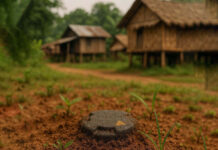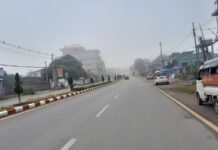As the Myanmar’s Union Government announced its plans to resume the construction of a two-lane highway, connecting Dawei Special Economic Zone (SEZ) and Thai-Myanmar border, after reaching agreements with the Thai and Japanese Governments on the 2 December 2017, the Karen National Union (KNU) on 1 February 2018, came up with a four-point statement underlining its concern, which is within the mold of justified allocation of natural resources extraction between the State/Region and the Central or Union Government.
 The KNU statement addressing the Myanmar, Thai and Japanese governments as well as the project developers, and financiers reads:
The KNU statement addressing the Myanmar, Thai and Japanese governments as well as the project developers, and financiers reads:
- In order to implement the project, comprehensive environmental and social impact assessments (ESIA) must be conducted in accordance with the laws of the Union of Burma/Myanmar, and the Land and Forestry Policy of the KNU, and international standards.
- Negotiations with stakeholders, including the KNU, must be conducted in advance to ensure sustainable development for local communities, revenue sharing between the Union and State/Regional Governments, and the right for communities to participate.
- In the implementation of the project, the principle of Free, Prior and Informed Consent (FPIC) must be used. As per international standards, fair compensation and land provision for the loss of land and livelihoods must be finalized before any further steps. In addition, access for local communities to markets, and plans for environmental conservation programs developments must be conducted.
- Design and construct the highway in a way that avoids or minimizes and mitigates impacts on the environment, including the area’s important forests, rivers and biodiversity, as well as, the Karen and other ethnic communities living in the area.
The KNU pointed out that in accordance to the provisions on the Nationwide Ceasefire Agreement (NCA), signed in October 2015, the Union Government must negotiate with the KNU regarding the implementation of such social-economic development.
According to Chapter 6, under the sub-heading “Tasks to be implemented during the interim period”, paragraph b and c stated:
- Planning of projects that may have a major impact on civilians living in ceasefire areas shall be undertaken in consultation with local communities in accordance with the Extractive Industries Transparency Initiative (EITI) Standard procedures and coordinated with relevant the Ethnic Armed Organizations for implementation.
- The government and the individual the Ethnic Armed Organizations shall coordinate the implementation of tasks that are specific to the areas of the respective Ethnic Armed Organization.
Stalled mega project
According to Eleven Myanmar report of January 22, Phyo Win Tun, minister for planning and finance at the Tanintharyi Region Government and vice-chairman-1 of the Dawei SEZ management committee, said Myanmar would push for the project to be resumed in the second half of this year.
He is said to be hopeful that Myanmar’s national Union Parliament would soon approve Thailand’s offer to provide a soft loan of Baht 4.5 billion for the construction of an Asean-standard two-lane highway to connect the two countries, so that the Dawei SEZ can move forward.
“We, regional authorities, have submitted our suggestion to the Union Government that Thailand’s loan should be urgently approved so the construction work can begin soon,” he said.
He stressed that the existing road from Htee Khee to the SEZ could not attract foreign investors due to the lack of infrastructure. In this regard, construction of the two-lane highway would be the first step to revive the stalled project.
Other hurdles
Apart from the Tanintharyi Region Government eagerness to push for the project and the reluctant approach of the KNU, there are also the opinions of the locals affected by the undertakings.
On February 25 last year, villagers impacted by the activities of the Italian-Thai Development company (ITD) in Dawei submitted a letter to the National Human Rights Commission of Thailand (NHRC of Thailand), requesting problems to be solved before reactivating the SEZ project. The letter asked for the firm to disclose all data and information related to the project, to undertake meaningful public participation and ensure that fair and adequate compensation is provided with the consent of the local community, according to the report of Myanmar Times.
U Ye Swan, a villager from Mayingyi village in Dawei, whose plantations are included in the project site, told the Myanmar Times earlier this month that almost all the villagers want to get fair compensation and an Environmental Impact Assessment (EIA).
Other than that in the same report, U Myint San, the vice chair of Dawei SEZ’s management committee, regarding the said two-lane road, said that there are two central issues to be decided – should the two-lane road be a public or a private road? And who should be in charge of the operations of the road?
“The management committee wants the ITD or another Thai company to upgrade the road. The management, maintenance and ownership of the road should lie in the hands of the Myanmar government. Otherwise the community will have to pay high toll fees – from US$6.5 to US$43,” he added.
High toll fees could present a problem for economic development in the region as it affects various kinds of transport and hence many industries including manufacturing and logistics.
What now?
Given such a backdrop, it now seems the stakeholders need to work out a compromise if the said project is to move forward.
The Union Government and the Regional Government are geared to move ahead if the financial loan from Thailand is work out which would likely sail through, as the Japanese are deeply involved, although it doesn’t like to be involved in the initial first stage of infrastructure projects.
The KNU would likely stick to its NCA provisions and push for the principle of Free, Prior and Informed Consent (FPIC), compensation, and environmental conservation, that would also be endorsed by the affected locals.
And with the stagnation of peace process, that is aiming to achieve a federal form of government, where allocation of natural resources extraction is still not in place, it is hard to imagine on how this mega project could be pulled through without officially agreed guidelines.
True, there are suggestions like the newly coined notion of “natural resources federalism”, which advocates a more justified and equitable allocation, either in a federal or unitary system of governance, where extraction of natural resources is concerned. But we are still in an initial stage and a long way off to seal that kind of agreement. And thus, the likelihood is that stakeholders would have to go through a lot of adjustment on allocation before it could really begin to move forward.












Leave a Comments